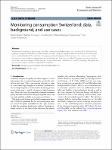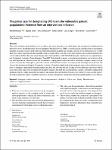Search
Author
- Marina, Dabić (3)
- Christa, Sys (2)
- Domingo, Ribeiro-Soriano (2)
- Haoyu, Wen (2)
- next >
Subject
- SDGs (4)
- SMEs (3)
- CSR (2)
- decision-making units (2)
- next >
Has File(s)
- true (260)
Search Results
In this article, we examine the accuracy and bias of market valuations in the U.S. commercial real estate sector using properties included in the NCREIF Property Index (NPI) between 1997 and 2021 and assess the potential of machine learning algorithms (i.e., boosting trees) to shrink the deviations between market values and subsequent transaction prices. Under consideration of 50 covariates, we find that these deviations exhibit structured variation that boosting trees can capture and further explain, thereby increasing appraisal accuracy and eliminating structural bias. The understanding of the models is greatest for apartments and industrial properties, followed by office and retail buildings. This study is the first in the literature to extend the application of machine learning ... |
This paper examines the critical role of Mega Infrastructure Projects in sustainable urban and peripheral development by presenting a Sustainable Infrastructure Serum Analysis supported by primary field research. In the Athens Metro case study, we examined the project's impact on sustainable development by analysing the opinions of the project's users. As a result, the Athens Metro serves as a case study to help us better understand sustainable infrastructure as a framework for green growth from the standpoint of society. The three pillars of sustainable development are inextricably linked. |
The use of algorithmic management systems is rapidly changing organizational models and practices, as millions of workers in multiple sectors worldwide are managed by computer software. Despite receiving increasing academic interest, little summarizing literature exist on the ways algorithmic systems are used in management. This article aims to fill this gap by systematically reviewing and qualitatively analyzing 172 articles on the topic. Our research contributes to the existent algorithmic management literature in three ways. First, we provide a descriptive overview of algorithmic management as a field of research. Second, we identify and synthesize the discussion on the key concepts of the topic, namely how algorithmic management: (1) simultaneously restrains and enables workers’... |
This paper studies intergenerational links in home ownership, an increasingly important wealth marker and a measure of economic status in itself. Repeated cross sectional UK data show that home ownership rates have fallen rapidly over time, most markedly amongst younger people in more recent birth cohorts. Evidence from British birth cohorts data supplemented by the Wealth and Assets Survey show a significant rise through time in the intergenerational persistence of home ownership, as home ownership rates shrank disproportionately among those whose parents did not own their own home. Given the close connection between home ownership and wealth, these results on strengthening intergenerational persistence in home ownership are therefore also suggestive of a fall in intergenerational ... |
Using new data from a three-wave panel survey administered in Germany between May 2020 and May 2021, this paper studies the impact of a negative shock affecting all strata of the population, such as the development of COVID-19, on preferences for redistribution. Exploiting the plausibly exogenous change in the severity of the infection rate at the county level, we show that, contrary to some theoretical expectations, the worse the crisis, the less our respondents expressed support for redistribution. We provide further evidence that this is not driven by a decrease in inequality aversion but might be driven by the individuals’ level of trust. |
Monitoring Consumption Switzerland is a public–private partnership between the University of St. Gallen and the payment companies Worldline and SIX that processes and publishes payment data on transactions in Switzerland processed by Wordline/SIX in real time. This paper provides background information on this novel source of data and presents their attributes, aggregation and granularity, and their interpretability. The paper presents several use cases that show the strengths of the data, and it alerts future users of the data to possible challenges. The paper also discusses the project's impact and provides an outlook. |
Small and medium-sized enterprises (SME) are under increasing pressure to implement sustainability practices and collaborate in sustainable development. To do so, they can choose to collaborate with other organisations in order to overcome the challenges and barriers found in moving towards sustainability. Sustainability issues in SMEs have been discussed in the last two decades, but the knowledge on the inter-organisational collaboration towards sustainability remains dispersed. In this sense, this paper aims to answer the question: what is known about inter-organisational cooperation oriented towards sustainability involving SMEs |
Innovation is a general measure of the success of a company and shows a positive relationship with several key factors such as collaboration with universities and technology centers or belonging to medium- and high-tech sectors. While many studies have found that gender diversity in company management teams has a positive influence on companies’ economic success, few have focused on the impact that the inclusion of women in the board of directors has on product, process, and organizational innovation. This paper builds on previous knowledge about the determinants of innovations and shows that greater gender management team diversity, compared to male-only teams, positively affects the achievement of said innovations. |
This study documents more than five years of analysis that drove the policy case, deployment, and retrospective evaluation for an innovative service model that enables Boston Emergency Medical Services (EMS) to respond quickly and effectively to investigation incidents in an area of heavy need in Boston. These investigation incidents are typically calls for service from passers-by or other third-party callers requesting that Boston EMS check in on individuals, often those who may appear to have an altered mental status or to be unhoused. First, this study reports the pre-intervention analytics in 2017 that built the policy case for service segmentation, a new Community Assistance Team designated “Squad 80” that primarily responds to investigation incidents in one broad area of the c... |
We extend the theoretical and experimental analysis of endogenous sorting in social dilemma games to decisions of trustees in trust games. Trustees first decide about the amount they send back if the trustor sends the money and then learn that they can exit the game for a payoff that is identical to the trustor’s endowment. We develop a behavioral model where trustors and trustees have reciprocal preferences, and hence put positive weight on the other player’s payoff if they perceive their behavior as kind. Our model yields two possible constellations: Only trustees with high reciprocity participate, or all types except those with intermediate reciprocity participate. Our data lend strong support for the second pattern, as we observe a U-shaped relation between the trustees’ partici... |










